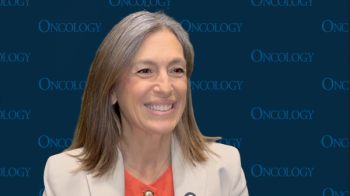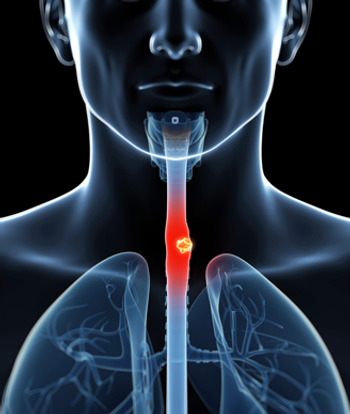
- ONCOLOGY Vol 21 No 5
- Volume 21
- Issue 5
Searching for Standards of Care in Gastroesophageal Cancers
Esophageal, gastroesophageal junction, and gastric cancers are underpublicized but are frequently lethal, and gastroesophageal junction adenocarcinomas are increasingly common diseases in the United States and around the world. Although often grouped together in studies of chemotherapy, clear distinctions can be made in the locoregional therapy of these diseases. Esophageal squamous cell carcinomas may be treated with surgery or radiation with concurrent chemotherapy, whereas esophageal adenocarcinomas and gastroesophageal junction adenocarcinomas are often treated with all three treatment modalities. Over the past several years, it has become increasingly evident that gastric cancer is a disease that is potentially sensitive to chemotherapy. In the perioperative setting—at least in the Western world—chemotherapy and sometimes radiation are applied. However, the optimal chemotherapy for advanced gastric or esophageal cancer remains unsettled, and there is no single standard regimen. Several new chemotherapy agents have demonstrated activity in these diseases, but the best chemotherapy remains to be determined. This paper will review the role of chemotherapy in gastroesophageal cancers.
Dr. Hwang has thoroughly and thoughtfully reviewed chemotherapy options for gastroesophageal cancerbut the catalogued trials tell a story of ponderously slow though incremental progress without identifying one optimal treatment regimen or modality.
Evolving Regimens
Most patients with gastroesophageal cancer eventually develop metastatic disease. As nicely outlined by Dr. Hwang, despite a large number of published phase II/III trials and occasional claims to the contrary, no chemotherapy has yet won the title of "standard of care" for either metastatic esophageal or gastric cancer. In metastatic gastroesophageal (GE) junction and gastric tumors, cisplatin/fluorouracil (5-FU) combinations have long served as the backbone of treatment.
Recent phase III trials using newer agents such as docetaxel, irinotecan (Camptosar), and oxaliplatin (Eloxatin) have reported encouraging results. In particular, the EOX (epirubicin [Ellence], oxaliplatin, capecitabine [Xeloda]) arm of the REAL-2 trial (in which substitutes oxaliplatin for cisplatin, and capecitabine for continuous-infusion 5-FU, in the ECF regimen) demonstrated a median survival of 11.2 months, with modest toxicity.[1] The DCF regimen (docetaxel, cisplatin, 5-FU) also has demonstrated efficacy, producing a time to progression of 5.6 months and a median survival of 9.2 months. However, this outcome came at the cost of what we consider to be an unacceptable rate of grade 3/4 toxicity (81%) and febrile neutropenia/neutropenia with infection (30%).[2] Different iterations of DCF may have an impact on both toxicity and efficacy in metastatic GE cancer.
Differing Histologies
In his discussion of esophageal cancer, Dr. Hwang makes a clear distinction between squamous cell carcinomas and adenocarcinomas of the esophagus, suggesting that these should be treated differently. He appropriately notes that the incidence of distal esophageal and GE junction adenocarcinomas is on the rise in the Western world, and that the inciting factors for squamous cancers and adenocarcinomas differ. However, we disagree with his assertion that these histologies behave differently enough to necessitate a different treatment paradigm.
On the one hand, there is ample evidence to suggest that distal esophageal adenocarcinomas and adenocarcinomas of the GE junction are very similar to proximal gastric cancers in their etiology and biology and, therefore, can be approached similarly. In a recent pooled analysis from four randomized clinical trials that enrolled patients with esophageal, GE junction, and gastric adenocarcinomas, investigators found no difference in clinical efficacy or toxicity of chemotherapy.[3] Thus, there is good justification for treating these diseases similarly.
On the other hand, although it is logical, given the anatomic proximity, similar epidemiology, and histopathology, to approach squamous cell esophageal cancers in the same way as head and neck cancers, there is little evidence to either support or refute this strategy. In fact, in the metastatic setting, squamous cell cancers and adenocarcinomas behave similarly, with a short-lived but high rate of chemotherapy responsiveness.[4] Thus, it is reasonable to palliate a patient with metastatic squamous cell carcinoma of the esophagus with either a head and neck cancer or gastric cancer regimen.
Trimodality Therapy
In localized disease, however, we believe it is a mistake to recommend against trimodality therapy (chemoradiotherapy and surgery). In esophageal cancer, where our treatments are not targeted to tumor biology and are only modestly effective, anatomic considerations seem to play a crucial role. In the case of cervical esophageal cancers, where proximity of the esophagus to vital structures often precludes acceptable functional preservation with resection, definitive chemoradiotherapy as used in head and neck cancer is the best option.
However, in the case of potentially operable thoracic esophageal cancer, we believe that evidence supports trimodality therapy as the standard of care for the following reasons: First, the majority of studies designed to evaluate locoregional therapy have included both squamous and adenocarcinoma histologies, so the data apply to both subtypes. Second, although it has been difficult to prove a survival advantage to trimodality therapy, studies have consistently shown lower locoregional relapse rates in patients receiving surgery in addition to chemoradiotherapy alone. Finally, as noted by Dr. Hwang, patients with residual disease after chemoradiotherapy fare poorly without surgery.
A potential treatment paradigm to consider is surgical therapy for those with incomplete responses to chemoradiation. Unfortunately, our ability to reliably distinguish those with a complete response from those with only a partial response is limited. Novel treatment paradigms that employ early positron-emission tomography (PET) scanning to predict treatment efficacy will hopefully allow us to make these distinctions. Thus, in the absence of definitive evidence to support a lack of benefit of surgery, and given that squamous cancers are more likely than adenocarcinomas to recur locally, we believe that surgery in good operative candidates adds value.
Conclusions
The study of esophagogastric cancer has been mired in the difficult distinctions between anatomic location and epithelial histology. We have been more likely to approach these diseases together both in investigations and in clinical practice because of their similarities in location and behavior. However, as Dr. Hwang points out, the etiology and epidemiology of the more proximal squamous cancers and the more distal adenocarcinomas are distinct. Thus, although we have not yet discerned them, there are biologic differences between a high thoracic esophageal squamous cell carcinoma and GE junction or cardia tumors, just as there may be biologic differences between GE junction/cardia tumors and distal gastric cancers. As we learn more about these biologic differences with emerging technologies like gene-expression array, hopefully we will uncover therapeutic targets that will allow us to capitalize on these differences, and improve the outcomes of patients afflicted with esophagogastric cancer.
Hanna Kelly Sanoff, MD
Richard M. Goldberg, MD
Disclosures:
Dr. Goldberg is a consultant for Amgen, Bristol-Myers Squibb, Genentech, Pfizer, and Sanofi-Aventis.
References:
1. Cunningham D, Rao S, Starling N, et al: Randomised multicentre phase III study comparing capecitabine with fluorouracil and oxaliplatin with cisplatin in patients with advanced oesophagagogastric cancer: The REAL-2 trial (abstract LBA4017). J Clin Oncol 24(18S):182s, 2006.
2. Moiseyenko VM, Ajani JA, Tjulandin SA, et al: Final results of a randomized controlled phase III trial (TAX 325) comparing docetaxel combined with cisplatin and 5-fluorouracil to CF in patients with metastatic gastric adenocarcinoma (abstract 4002). J Clin Oncol 23(16S):308s, 2005.
3. Chau I, Norman AR, Cunningham D, et al: Is there a differential chemotherapy effect in patients with locally advanced oesophageal, oesophago-gastric junction, and gastric adenocarcinomas? A pooled analysis of four randomised controlled trials (abstract 75). 2007 Gastrointestinal Cancers Symposium. Orlando, Fla; Jan 19-21, 2007.
4. Homs MY, v d Gaast A, Siersema PD, et al: Chemotherapy for metastatic carcinoma of the esophagus and gastro-esophageal junction. Cochrane Database Syst Rev 4:CD004063, 2006.
Articles in this issue
almost 19 years ago
The Emerging Epidemic of Gastroesophageal Cancers: A Neglected Volcano?almost 19 years ago
CDC Finalizes Advisory Panel Reccommendations for HPV Vaccinealmost 19 years ago
Study Finds Most Fentanyl 'Lollipop' Prescriptions Are Off-Labelalmost 19 years ago
Gynecologic Cancer Survivors: A Comprehensive Approachalmost 19 years ago
Treating Metastatic Colorectal Cancer While Questions Remain Unansweredalmost 19 years ago
Active Lifestyle Reduces Risk of Invasive Breast Canceralmost 19 years ago
Crossing the Quality ChasmNewsletter
Stay up to date on recent advances in the multidisciplinary approach to cancer.



































